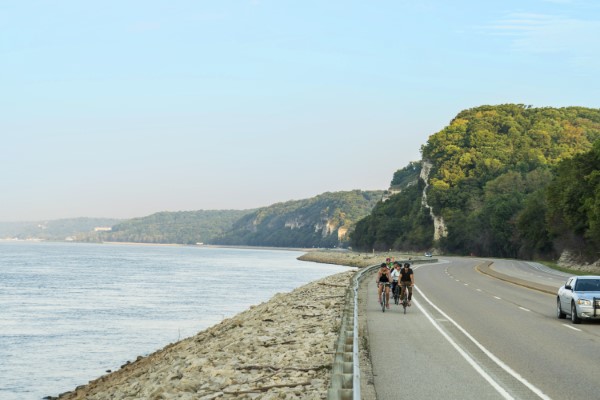Why Illinois is the right place for you.
Whether it be young professionals, families or businesses looking for where to relocate next, Illinois is often at the top of the list. The state’s diversity, from its landscape to its economy to its people, is undoubtedly one of its strongest selling points.
For instance, Chicago, one of the largest cities in the country, boasts world-class cultural institutions, a dynamic food scene, and bustling business districts. Yet, only a few hours away, one can find charming small towns like Galena, mid-sized, more family-friendly cities such as Peoria and Rockford, and a vast expanse of rivers and forests ready to be explored.
This unique blend of urban excitement and rural tranquility gives Illinois the ability to cater to projects of varying sizes and people of differing passions. In 2023, the state secured 552 business expansion or relocation projects, earning a No.2 ranking in Site Selection Magazine’s Governors Cup for the second year in a row. Many of the attributes attracting business also contribute to the state’s excellent quality of life.
Education
One of Illinois’ cornerstones is its top-tier academic system. Ranked No.2 in Education in CNBC’s 2023 Top States for Business report, the state is home to some of the best public and private schools in the nation, ensuring that residents have access to superior educational opportunities from kindergarten through college.
The University of Illinois system, with campuses in Urbana-Champaign, Chicago, and Springfield, and Northwestern University, located in Evanston, are leaders in research and innovation, attracting students and industry partners from around the globe.
These institutions, along with Illinois’ extensive community college system, not only supply the state with a highly skilled workforce but continue to open doors for its citizens to explore good-paying careers in various sectors such as agriculture, manufacturing, energy, finance, technology, health care and film. Illinois’ diverse economic environment provides ample opportunities for its residents to pursue their desired career pathways.

The Chicago Theater.
Photo courtesy of Halle Busby Photography
Affordability and Access
For those looking to stretch their dollar further, Illinois offers many mid-sized cities and small towns where the cost of living is significantly lower while still in close proximity to major cities.
In the southern region of the state, cities such as Alton, Edwardsville, and Belleville are less than 30 minutes away from St. Louis, Missouri. Boasting highly rated school systems, scenic views of the Mississippi River and thriving economies, these areas provide residents with the benefits of urban living without the high price tag, making them ideal for families and individuals seeking a more economical and slower-paced lifestyle.
The same can be said for the communities within the Greater Chicago area. Like the rest of the state, these communities differ from town to town. Situated on the shores of Lake Michigan, Waukegan offers affordable living with scenic views and various outdoor activities. While slightly more expensive than other suburbs, Naperville is still a more affordable alternative to living in Chicago while boasting a similar energetic downtown area.
Though the prices and atmosphere may vary, one thing stays the same throughout the state: the convenience of a central location in close proximity to many major cities.

Main Street Galena.
Photo courtesy of Illinois Office of Tourism
Determination to Grow
These advantages, combined with the state’s robust infrastructure, incentives, and industry networks, have led to consistent year-over-year growth. As more companies and individuals relocate to Illinois, the state’s leadership is committed to building on this momentum, reinvesting the success back into its communities, and further enhancing their appeal.
In August 2022, Governor JB Pritzker and the Illinois Department of Commerce and Economic Opportunity awarded $106 million in grants from the Rebuild Illinois Downtowns and Main Streets Capital (RDMS) program to 50 communities.
Launched through Rebuild Illinois State capital funds and further expanded by the American Rescue Plan Act (ARPA), the grants support projects that will revive and refresh commercial hubs, beautify and modernize downtowns, address critical infrastructure needs, boost jobs and improve residents’ quality of life.
Initially created to accelerate economic recovery following the COVID-19 pandemic, this program continues transforming cities and small towns statewide. In April, the RDMS program announced its second round of funding. A total of $20 million will be available for projects, as well as an additional $10 million in Research in Illinois to Spur Economic Recovery (RISE) grants.
“We empower our communities by connecting people with the resources they need to make the changes they want to see,” said Lt. Governor Juliana Stratton. “Downtown spaces are hubs for connection; people want to spend time together in public spaces when those spaces are clean, functional, and vibrant.”
With awards ranging from $250,000 to $2 million, by working in tandem, these programs are poised to elevate local economies in a myriad of ways. While a project eligible for RDMS funding must be located in a commercial center or downtown area, the objective can range from modifying roadways, parking and public way improvements, investments in parks and venues or plazas for public use to sustainability upgrades, structural repairs and mixed-use or transit-oriented development.
RISE recipients may include capital and non-capital projects such as water, sewer, or broadband infrastructure, investment in affordable housing, local workforce development programming, retrofitting or renovating facilities and buildings, investment in site readiness for business development, and tourism promotion programming.
“Supporting our downtowns and Main Streets is essential to maintaining strong communities across Illinois,” said Senator Karina Villa (D-West Chicago). “The hearts and souls of our neighborhoods are often found in our local city centers, and the RDMS and RISE grant programs will accelerate economic growth that will be felt for years to come.”

